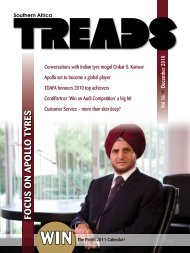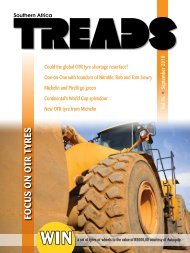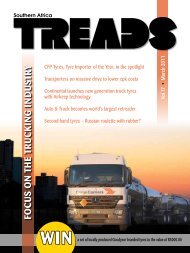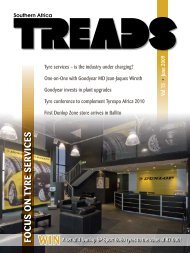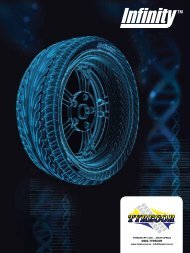Fo c u s o n Tyre IM PorTs - SA TREADS
Fo c u s o n Tyre IM PorTs - SA TREADS
Fo c u s o n Tyre IM PorTs - SA TREADS
Create successful ePaper yourself
Turn your PDF publications into a flip-book with our unique Google optimized e-Paper software.
<strong>Fo</strong>cus on <strong>Tyre</strong> Imports • 9<br />
<strong>IM</strong>PORTS<br />
– HAVE THE TABLES TURNED?<br />
Close on 50% of the current tyre consumption<br />
in South Africa is made up of imported makes,<br />
a staggering statistic that is deeply indicative<br />
of the rising popularity of foreign made tyres<br />
over the last few years. Price is the primary<br />
reason for the rise in import figures, with<br />
low cost producers from emerging countries<br />
continuing to target our market with products<br />
that are often of questionable quality;<br />
availability is another, especially as it is not<br />
economically viable for local tyre plants to<br />
comprehensively cater to the diverse needs of<br />
the market by way of application and tyre size.<br />
So, not all imports entering our market potentially pose a risk to the<br />
consumer. The local four manufacturers – Bridgestone, Goodyear, Apollo<br />
and Continental – are all compelled to import tyres on a frequent basis<br />
to supplement their product range. Plus, <strong>SA</strong>’s status as a global player<br />
demands that the <strong>SA</strong> consumer has access to the world’s leading tyre<br />
brands from Europe, U<strong>SA</strong>, and the Far East.<br />
With that said, the rise of ‘dubious’ operators who are dumping low cost<br />
tyres in the market, whilst also attempting to evade paying the required<br />
import duties, is posing a significant threat to the local manufacturing<br />
industry as well as to the reputable importers, not to mention the end user.<br />
<strong>Fo</strong>r over a decade, local tyre companies have been campaigning for playing<br />
fields to be levelled, something which they claim can only be achieved by<br />
clamping down on questionable low cost products and the illicit practices<br />
that accompany them. This they have done by eliciting assistance from<br />
relevant government bodies such as the DTI (Department of Trade and<br />
Industry), the NRCS (National Regulator for Compulsory Specifications)<br />
and ITAC (International Trade Administration Commission for South Africa).<br />
And according to the import segment of the market, their efforts have not<br />
been in vain. Local representatives of some of the world’s leading tyre<br />
makers are alleging that although price may have once played a significant<br />
role in securing a presence for foreign tyres in this market, this is no longer<br />
case. They further suggest that the tables have turned with respect to the<br />
market dynamic, so much so, that imported tyres are now receiving the<br />
‘short end of the stick’, so to speak.<br />
“I never thought I’d see the day when imported passenger tyres would sell<br />
for more than some locally produced makes, but this is precisely what is<br />
taking place,” said Charl de Villiers, MD of <strong>Tyre</strong>cor. I continuously circulate<br />
amongst dealers comparing pricing from local and imported brands for the<br />
various segments, and this new development is alarming.” His concerns are<br />
being echoed by opposition companies such as Tubestone and CFP <strong>Tyre</strong>s.<br />
“It is becoming increasingly more difficult for us to compete against the<br />
local makes,” they confirmed.<br />
But Julio Fava, Executive Manager Export, OE and Agri for Bridgestone <strong>SA</strong><br />
disagreed: “Local products remain more expensive than imports, it’s only<br />
the differential that has reduced.”<br />
“We are extremely surprised to hear of these rumours,” echoed Riaz<br />
Haffejee, CEO, Apollo <strong>Tyre</strong>s <strong>SA</strong>, “since this is contrary to our experience.”<br />
The price issue aside, importers are faced with their own unique set of<br />
trading challenges. Currently in the spotlight is the sudden withdrawal of<br />
the agricultural rebate applicable to tyres entering the country under the<br />
Tariff Heading 4011.61 This rebate was apparently set in place some years<br />
ago to assist the agricultural sector that is compelled to import herringbone



